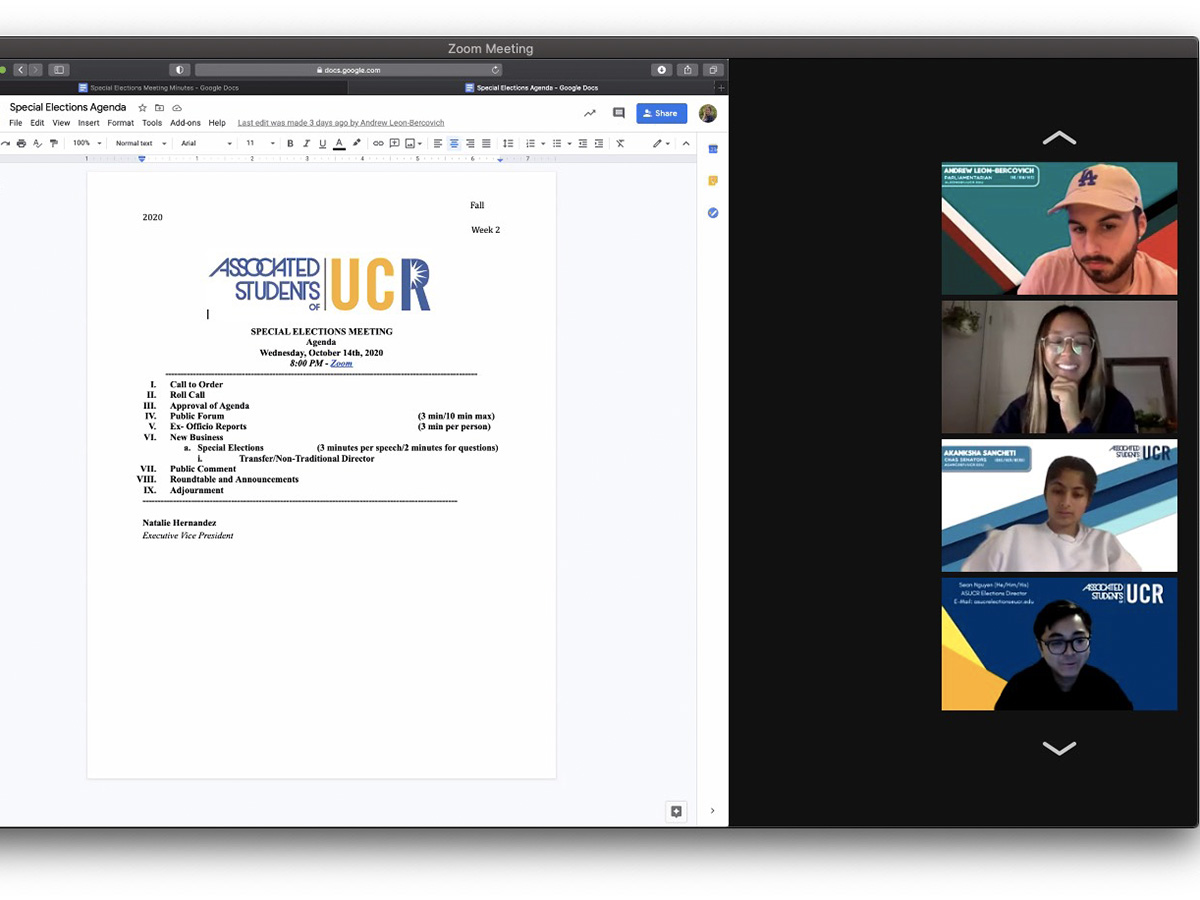The ASUCR senate elected a new transfer and non-traditional director on Wednesday, Oct. 14, after Ramses Cuadros, previous director, resigned in the summer after only holding office for a few months. Five candidates: Blythe Reyes, Adan Perez, Elizabeth Samson, Alexia Carillo Villalobos and Kaitylyn Hall were given three minutes to present a speech, and the senate was allowed three minutes to ask the candidates questions.
The elections took place after the second senate meeting of the quarter, where the ASUCR senate approved SB-F20-004, updating the previous Green Campus Action Plan (GCAP) bylaws from the Office of the Undergraduate Sustainability Director into the Office of the Vice President of Sustainability. This change also begins the process of creating paid positions within GCAP for the vice-chair, marketing director, programming director and policy director positions. During the meeting, the senate also approved the finance hearing minutes for week one and week two.

To begin the special election, Reyes was the first to step up to the virtual podium to present her speech — the other candidates were placed into a waiting room until it was their time to speak. Reyes, a fourth-year liberal studies transfer student, highlighted her previous work in ASUCR as the Transfer and Non-Traditional Student Committee event coordinator and vowed to create more opportunities for students to engage with one another. She outlined the issues that transfer students face that she would like to tackle including: lack of acknowledgement, not receiving proper help from universities, registration issues, financial aid issues and the unnecessary pressure of being told to finish in two years. “We’re not asking for an easy way out,” stated Reyes, “We’re looking for a fair one.”
Adan Perez then stepped up to speak, sporting a Zoom background from the popular U.S. T.V. show “The Office.” Perez, a fifth-year senior majoring in both media and cultural studies and Native American studies, also highlighted the leadership experience he has gained in his time at UCR as a peer mentor for Native American Student Programs (NASP) I-Connect mentorship program, a part of the newly reinstated Indigenous Student Task Force and secretary for Native American Honor Society, Native American Student Association and the Underground Scholars Initiative. Perez stated that his experience as a transfer student at UCR has been both positive and negative — positive because he was able to build community amongst his peers, but negative because he felt that the institution constantly polarized transfer and non-traditional students since the opportunities offered to them were often few and far between. Perez acknowledged that he does not have a clear solution, but some of his goals are to create town halls and opportunities to raise their concerns and then work to fix them.
The next candidate, Elizabeth Samson, a fourth-year English major, kept her Zoom camera turned off throughout the duration of her speech. Samson clearly stated her desire to expand the social media efforts of the Transfer and Non-traditional Student Committee. One of her goals, if elected, was to clearly define what a non-traditional student was. “If we can actually define it, then we will know who we are actually helping,” stated Samson.
Alexia Carillo Villalobos, a fourth-year sociology major, presented her speech to the senate and expounded on her leadership experience in Puente, the Underground Scholars Initiative and student government in her community college. According to Villalobos, one of the most pressing issues she has noticed as a transfer and non-traditional student is not having enough time to access various resources on campus such as research opportunities and not having enough student involvement across campus. Another problem, according to Villalobos, is that non-traditional students, specifically formerly incarcerated students, are not able to obtain jobs on campus. Villalobos acknowledged the impact that student governments have on their universities and hoped to bring her leadership experience into the role. Some of her goals include making ASUCR an inclusive space for all transfer and non-traditional students and utilizing social media for outreach to other groups on campus.
Finally, Kaitylyn Hall, a fourth-year education and history major, highlighted the need for visibility within ASUCR. Hall stated that during her first year, she was not aware that ASUCR had a transfer and non-traditional student director. After hearing about the position, she knew that she wanted to increase the outreach of ASUCR to further assist the transfer and non-traditional student community. Hall questioned the ways in which ASUCR could increase their advocacy for transfer and non-traditional students and added, “We must know the community before we advocate for them.” She plans to do so by sending mass emails to students about resources and opportunities that are available to them and increasing accessibility to such resources. Hall also added that she has a passion for social justice, specifically anti-racism and plans to implement that into her role if elected. CHASS Senator Juan Morales asked Hall to expound on her application where she listed one of her goals to create viable mental health resources for transfer and non-traditional students. She responded by stating she would hope to implement programs where mental health professionals could offer their services to members of the transfer and non-traditional student community, as well as offer support groups for the community to help each other.
After a 30-minute deliberation, the ASUCR senate reconvened and elected Kaitylyn Hall as the new transfer and non-traditional student director for the 2020-2021 school year.







